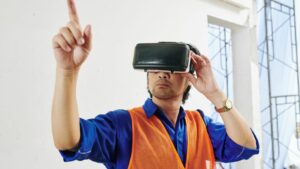Are you curious about the exciting world of augmented reality jobs? As someone who has delved into this dynamic field, I’ll guide you through the opportunities and trends shaping the AR job market. With the rapid advancement of technology, AR has transformed industries, creating a demand for skilled professionals.
In this article, I’ll explore the diverse roles available in augmented reality, from AR developers to UX designers, and the skills needed to thrive in these positions. Whether you’re a tech enthusiast looking to break into the AR industry or a seasoned professional seeking new challenges, understanding the job landscape is crucial.
Augmented Reality Jobs
Growth Factors for AR Jobs
Augmented reality (AR) jobs have been experiencing exponential growth in recent years. As technology advances and businesses seek innovative solutions, the demand for skilled professionals in the AR field continues to rise. I’ll delve into the key factors driving this growth to help you understand the immense opportunities in the AR job market.
Key Industries Driving Demand

Numerous industries are fueling the demand for augmented reality professionals. From healthcare to retail, AR technology is revolutionizing how businesses operate and engage with their customers. I’ll outline the key sectors driving the need for AR talent, providing insights into where the most promising job opportunities lie.
Types of Augmented Reality Jobs
AR Software Development
In AR software development, I focus on creating immersive and interactive experiences by designing and coding AR applications. It involves working with AR software development kits (SDKs) like ARCore and ARKit to integrate digital content into the physical world seamlessly. As an AR software developer, I leverage my programming skills in languages such as C#, C++, or Java to build AR functionalities for various platforms like smartphones, tablets, and AR glasses. This role requires a strong understanding of 3D modeling, rendering, and spatial mapping to bring AR projects to life.
AR Hardware Engineering
In AR hardware engineering, I am involved in designing and developing the physical components that enable AR experiences. I work on optimizing hardware devices such as headsets, smart glasses, and sensors to enhance the user’s AR interactions. As an AR hardware engineer, I focus on improving display technologies, sensor accuracy, and battery efficiency to deliver seamless AR performance. This role requires expertise in electronics, optics, and mechanical engineering to create cutting-edge AR devices that provide a comfortable and immersive user experience.
AR Game Design and Development
In AR game design and development, I combine my passion for gaming with augmented reality technology to create engaging and interactive gaming experiences. I work on conceptualizing AR game mechanics, designing virtual environments, and implementing AR features that blur the line between the real world and the digital realm. As an AR game developer, I utilize game engines like Unity or Unreal Engine to build AR games for mobile devices and AR headsets.
Skills Necessary for a Career in AR
Technical Proficiencies Required

When it comes to pursuing a career in augmented reality (AR), having strong technical skills is crucial. As an AR professional, I need to be proficient in programming languages such as C#, C++, or Java to develop AR applications effectively. Familiarity with AR development tools like Unity3D or Unreal Engine is essential for creating immersive AR experiences.
Creativity and Problem-Solving
In the realm of AR jobs, creativity and problem-solving skills play a significant role in developing innovative AR solutions. I constantly need to think outside the box to create engaging AR experiences for users. Whether designing AR interfaces or developing interactive AR games, creativity is key to standing out in this competitive field.
Continuous Learning and Adaptation
In the dynamic field of AR, continuous learning and adaptation are essential for staying relevant and competitive. As an AR professional, I’m constantly upgrading my skills and staying abreast of the latest technological advancements in augmented reality. Whether learning new AR development frameworks or exploring emerging AR trends, keeping up with industry changes is crucial for career growth.

